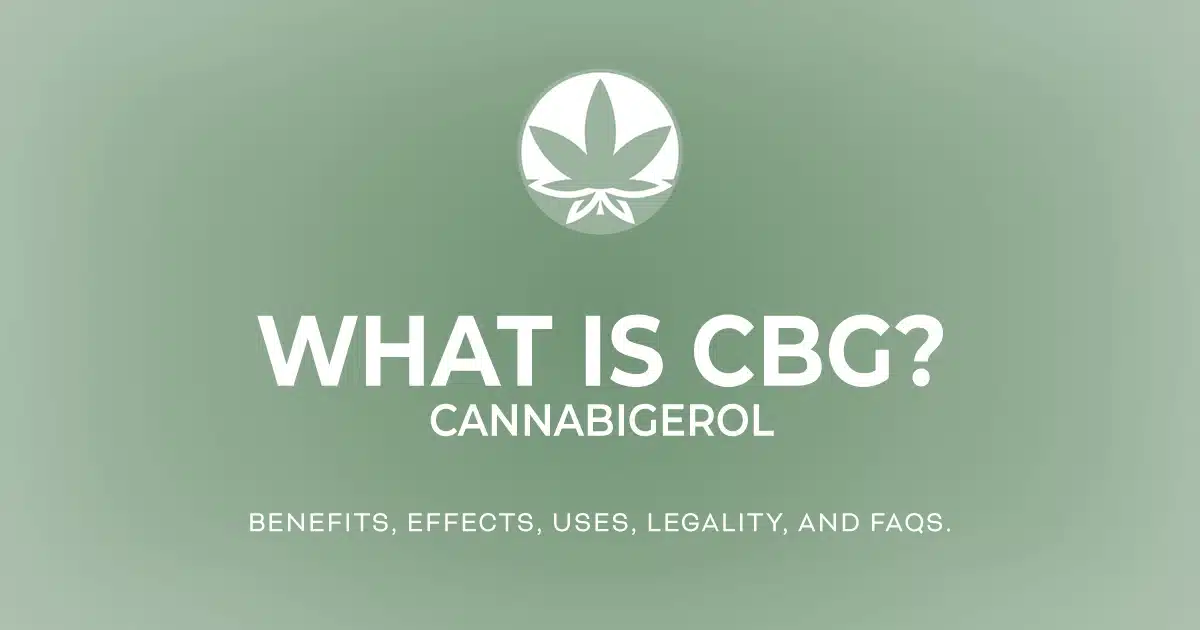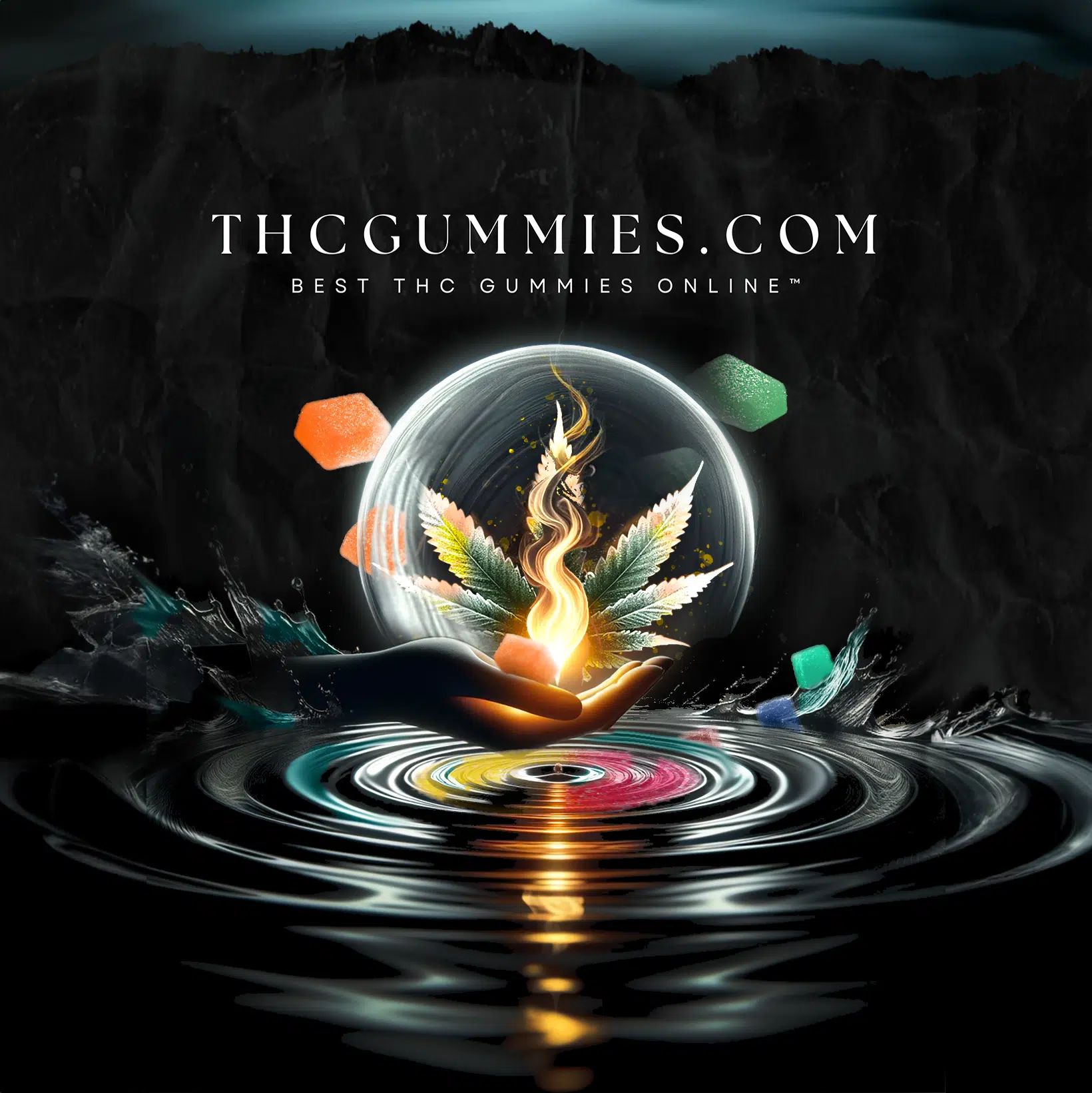What Is CBG?


Christopher Visser
Multi-Cannabis Business Owner
Christopher Visser, the Founder and CEO of Cannabidiol Life and THCGummies.com, is a distinguished figure in the CBD industry, recognized for his pioneering contributions since 2016. With over 120 published articles, Christopher has become a reputable cannabis researcher, writer, and author. He's built two prosperous cannabis ventures that collectively generated millions in annual sales. His in-depth analysis of numerous cannabis studies, collaboration with medical professionals, and personal engagement with thousands of customers underline his expertise and commitment to advancing cannabis understanding daily.
-
 Written By:
Christopher Visser
Written By:
Christopher Visser
- Published:
- Updated: February 8, 2024
- 2 Comments: Feed The Flame?
CBG, short for Cannabigerol, is a non-intoxicating cannabinoid found in cannabis. Known as the 'mother of all cannabinoids,' it serves as a precursor to other cannabinoids such as CBD and THC. Praised for its potential therapeutic effects, CBG offers promising avenues for research and wellness.
Table of Contents
- Tags: What Is
If you’ve been keeping up with the latest trends in natural health and wellness, you’ve probably heard of CBD, but have you heard of its lesser-known cousin, CBG? What is CBG, you ask? Cannabigerol (CBG) is often referred to as the “mother of all cannabinoids” and has been gaining attention for its potential health benefits. In this comprehensive guide, we’ll dive into the world of CBG, its benefits, uses, and how it differs from other cannabinoids like CBD and THC. Get ready to explore the fascinating world of this promising cannabinoid.
Short Summary
Research and read customer testimonials when selecting CBG products.
CBG is a non-psychoactive cannabinoid with potential therapeutic benefits for various health conditions.
Consult a healthcare professional before using CBG to ensure safety and efficacy.
Keypoints
CBG, or cannabigerol, is a non-psychoactive cannabinoid found in both cannabis plants and hemp plants. As the precursor to other cannabinoids like CBD and THC, CBG has potential therapeutic benefits, such as reducing anxiety, increasing dopamine levels, and possessing anti-inflammatory and neuroprotective properties.
CBG products, including CBG oil and tinctures, full-spectrum CBD products, and CBG gummies, have been gaining popularity. To ensure the quality of these products, it’s important to research the company, review third-party lab results, and read customer testimonials.
Understanding CBG: The Basics
CBG is a type of cannabinoid derived from the cannabis plant and has been used in ancient cultures for various purposes, such as warding off parasites, inducing appetite, and treating phlegm, catarrh, and diarrhea.
Although evidence suggests that hemp was used for medical purposes in both ancient Egypt and China, the two most widely known phytocannabinoids today are cannabidiol (CBD) and tetrahydrocannabinol (THC). The primary distinction between THC and CBD is that THC has the potential to induce a psychoactive experience, whereas CBD does not.
CBG is derived from cannabigerolic acid (CBGA), an acidic form of CBG, which is converted into other cannabinoids like THCA and CBDA through decarboxylation. As the plant matures and absorbs more UV light, CBGA breaks down and converts into these acidic precursors.
Interestingly, even a small amount of CBG present in CBG oil, typically 1-3% by weight, is sufficient to stimulate the endocannabinoid system and restore balance. The remainder of the oil usually consists of inactive carrier oil, such as MCT oil or coconut oil.
The “Mother of All Cannabinoids”
CBG gets its nickname “mother of all cannabinoids” because it originates from cannabigerolic acid (CBGA), the precursor to the acidic forms of THC and CBD (THCA and CBDA). This means that CBG is essentially the source of all other cannabinoids, both in acidic form and neutral, making it a significant player in the world of cannabinoids.
CBG is a unique cannabinoid in that it is the precursor to all other cannabinoids. It is the first cannabinoid to be produced in the cannabis plant and is the source of all other cannabinoids. This makes it a very important component of the medical cannabis plant and its effects. CBG has been found to be effective.
CBG in Cannabis Sativa L. (Hemp) Plants
Cannabigerol (CBG) is naturally found in both cannabis and hemp plants, with the majority of young cannabis plants often containing only 1% CBG. CBG can be obtained from young cannabis plants and hemp plants, as well as sugarcane, through a sustainable fermentation process. Generally, CBG is present in a concentration of 1%, while CBD and THC typically have concentrations of 20 to 25% and 25 to 30%, respectively.
The entourage effect, or whole-plant medicine, suggests that the combination of cannabinoids and terpenes present in cannabis products may have greater medicinal efficacy than if consumed in isolation for some individuals.
How CBG Interacts with Our Bodies
CBG molecules are known to interact with cannabinoid receptors in the body and endocannabinoid system. This interaction has far-reaching effects in terms of performance and maintenance of healthy functions. Research has shown that CBG binds to both CB1 and CB2 receptors within the body’s endocannabinoid system. This indicates that CBG can directly interact with these receptors in the body’s internal systems, potentially counteracting the effects of other cannabinoids, such as THC.
The endocannabinoid system is a complex cell-signaling system that regulates and controls many of our essential bodily functions, including those of the central nervous system, metabolic functions, and biological functions. The two primary cannabinoid receptors in the human body are CB1 and CB2, which are responsible for maintaining homeostasis and regulating functions such as appetite, pain perception, and memory.
Endocannabinoid System
The endocannabinoid system plays a key role in regulating and controlling many essential bodily functions, such as appetite regulation, mood disorders, pain perception, and memory. It is involved in maintaining homeostasis, which is the stable internal environment required for optimal health.
The primary cannabinoid receptors in the human body, called CB1 and CB2, are crucial for the proper functioning of the endocannabinoid system, making it an important target for potential therapeutic treatments involving CBG.
CBG and Cannabinoid Receptors
CBG has been observed to bind to both CB1 and CB2 receptors, similar to CBD, though with a lower affinity. Acting as a partial agonist at these receptors, CBG is believed to augment the activity of anandamide, a neurotransmitter that plays a key role in improving pleasure and motivation, controlling appetite and sleep, and in reducing inflammation in some chronic pain side.
This interaction between CBG and cannabinoid receptors may contribute to its potential therapeutic benefits in various health conditions.
Potential Health Benefits and Uses of CBG
CBG is a promising cannabinoid with potential therapeutic benefits for various health conditions. Research has demonstrated that CBG may help reduce inflammation, pain, and nausea, as well as impede the proliferation of cancer cells. High CBG strains may be beneficial in the treatment of conditions such as inflammatory bowel disease, Crohn’s disease, and colon cancer. Moreover, CBG is non-psychoactive, meaning it does not produce the mind-altering effects associated with THC, making it a potentially safer option for those seeking relief without the intoxicating high.
Although research on CBG is still in its early stages, it shows promise in the treatment of neurological disorders and cancer. CBG has been observed to have neuroprotective properties in mice intoxicated with 3-nitropropionate (3NP), with improvements in motor deficits and preservation of striatal function. Additionally, it has been found to possess robust antioxidant activity, with the ability to scavenge free radicals and potentially provide neuroprotection.
Further research is necessary to fully understand the potential therapeutic applications of CBG in humans.
Neuroprotective Properties
CBG’s neuroprotective properties have been observed in animal studies, where it has been shown to improve motor deficits and preserve striatal function in mice intoxicated with 3-nitropropionate. Furthermore, CBG has demonstrated robust antioxidant activity, scavenging free radicals and potentially providing neuroprotection.
These findings suggest that CBG may hold promise as a potential treatment for neurological disorders, although more research is needed to confirm its efficacy in humans.
Anti-Inflammatory Effects
CBG has demonstrated anti-inflammatory properties, which may help mitigate inflammation in various areas of the body, including gut health and cognitive function. In a study conducted with mice, CBG had a beneficial effect on the symptoms associated with inflammatory bowel disease.
Furthermore, its anti-inflammatory properties could offer numerous benefits for cognitive function, as inflammation has been linked to various cognitive disorders. These findings highlight the potential therapeutic benefits of CBG in treating inflammation-related health conditions.
Antibacterial Properties
CBG has been found to possess antibacterial properties against various bacteria, including methicillin-resistant Staphylococcus aureus (MRSA) and Streptococcus mutans. These findings suggest that CBG may have potential applications in the treatment of bacterial infections and the enhancement of gut health by combating harmful bacteria that can lead to intestinal inflammation.
The antibacterial properties of CBG, combined with its anti-inflammatory effects, make it a promising candidate for further research and potential therapeutic applications.
Comparing CBG with CBD and THC
While CBG, CBD, and THC are all cannabinoids derived from the cannabis plant, they differ in terms of molecular structure and origin. CBG is known as the “mother of all cannabinoids” because it is the source of all other cannabinoids, both acidic and neutral. Although CBD and THC are more widely known and researched, it is often argued that CBG is more potent due to its role as a precursor to all other cannabinoids. Moreover, CBG is non-psychoactive, unlike THC, making it a potentially safer option for those seeking relief without the intoxicating high.
Research on CBD is more extensive than that on CBG, but both cannabinoids have shown potential therapeutic benefits. It has been suggested that CBG may have a greater impact on certain inflammatory diseases when taken in combination with CBD, potentially increasing their collective efficacy. This highlights the need for further research to understand the full therapeutic potential of CBG and its relationship with other cannabinoids, such as CBD and THC.
Non-Psychoactive Nature
Unlike THC, CBG does not produce a euphoric feeling or alter your mental state, making it non-psychoactive. This characteristic makes CBG a more appealing option for those seeking potential therapeutic benefits without the mind-altering psychoactive effects often associated with THC.
As research continues to explore the potential benefits and uses of CBG, its non-psychoactive nature may contribute to its growing popularity as a natural alternative for various health conditions.
Therapeutic Benefits
CBG has shown potential therapeutic benefits for various health conditions, such as anxiety, multiple sclerosis, and glaucoma. While more research is needed to fully understand the scope of CBG’s therapeutic potential, its ability to interact with both CB1 and CB2 receptors in the endocannabinoid system suggests that it may have a wide range of applications in the treatment of various ailments.
As our understanding of CBG continues to grow, it is likely that its therapeutic benefits will become more widely recognized and utilized in the healthcare industry.
CBG Products and How to Use Them
CBG oil is a tincture containing the active ingredient CBG, which may provide relief for various health conditions. Additionally, full-spectrum CBD products, which are more widely available, are believed to be most effective when all cannabinoids are taken together. These products offer an accessible and convenient way for individuals to experience the potential benefits of CBG and other cannabinoids.
To ensure the quality of CBG products, it’s important to research the company, review third-party lab results, and read customer testimonials. With the growing interest in CBG and its potential health benefits, it’s essential to make informed decisions when selecting and using CBG products to ensure the best possible results for your individual needs.
CBG Oil and Tinctures
CBG oil is a whole-plant extract containing a full range of synergistic cannabinoids and terpenes with a concentration of 60mg/mL. It can be taken orally, applied topically, or inhaled, providing users with a versatile option for incorporating CBG into their daily routine.
As with any new supplement, it’s important to adhere to the product label instructions and seek professional medical advice prior to using CBG oil to ensure safe and effective use.
Full-Spectrum CBD Products
Full-spectrum CBD products encompass all the beneficial compounds naturally occurring in the cannabis plant, including cannabinoids, terpenes, flavonoids, and fatty acids. These products may also contain up to 0.3% of THC, the psychoactive compound found in cannabis.
The combination of cannabinoids and terpenes in full-spectrum CBD products is believed to create a synergistic effect, enhancing the overall efficacy of the product. This concept, known as the entourage effect, highlights the potential benefits of using full-spectrum CBD products in conjunction with CBG to maximize their therapeutic potential.
Tips for Finding Quality CBG Products
When searching for quality CBG products, it’s essential to look for reputable brands that offer third-party lab results and precise labeling. This will help ensure that the product you’re purchasing contains the appropriate concentration of CBG and other cannabinoids, as well as being free from contaminants.
Additionally, reading customer testimonials and engaging with online communities can provide valuable insight into the experiences of others who have used the product, helping you make an informed decision about whether it’s the right choice for you.
Potential Side Effects and Precautions
At present, there is limited information regarding the side effects of CBG. Studies conducted on rats suggest that the compound is well tolerated, but there is not yet enough research to draw conclusions on its effects in humans. As with any new supplement, it’s essential to consult with a healthcare professional before using CBG products to ensure their safety and efficacy for your individual needs.
Potential drug interactions should also be taken into account when considering the use of CBG. Like other cannabinoids, CBG can modulate the activity of cytochrome P450 enzymes in the liver, which are responsible for the metabolism of many medications. Consequently, consulting with a doctor or pharmacist before using or considering CBG is recommended, particularly if you are taking medications with a grapefruit warning.
Limited Human Research
While existing human research on CBG suggests that it may have potential therapeutic applications in the treatment of neurological disorders and cancer, as well as anti-inflammatory properties, further research is necessary to gain a comprehensive understanding of the effects of CBG on the human body.
As our knowledge of CBG continues to expand, it is essential that future studies investigate its potential side effects, precautions, and interactions with other medications to ensure the safe and effective use of this promising cannabinoid.
Drug Interactions
It is important to be aware of potential drug interactions when using CBG products. CBG, like other cannabinoids, can interact with certain medications and supplements, particularly those with a grapefruit warning. This is because CBG may modulate the activity of cytochrome P450 enzymes in the liver, which are responsible for the metabolism of many medications.
To ensure the safe and effective use of CBG, it is recommended to consult with a healthcare provider prior to use of prescription medications, especially if taking medications with a grapefruit warning.
Types of CBG Products You Can Buy Online
Various forms of CBG products are available for purchase online, including oils, capsules, tinctures, and topicals. CBG oils and tinctures are concentrated forms of CBG that can be ingested orally or applied topically, while CBG capsules offer a convenient way to take CBG with a range of dosages available to suit individual needs.
CBG topicals, such as creams, lotions, and balms, can be applied directly to the skin for localized relief, making it easy for individuals to incorporate CBG into their daily routine and experience its potential benefits.
What are CBG gummies?
CBG gummies are flavorful soft candies infused with CBG and other cannabinoids, providing a convenient and enjoyable way to experience the potential benefits of CBG. These gummies come in a variety of flavors and dosages, making it easy for individuals to find a product that suits their personal preferences and needs.
Whether taken daily for long-term health benefits or as needed for specific concerns, CBG gummies offer a simple and accessible option for incorporating CBG into your wellness routine.
Conclusion
CBG is a promising cannabinoid with potential therapeutic benefits for a range of health conditions. While research is still in its early stages, preliminary findings suggest that CBG may have a wide range of applications, from neuroprotection to anti-inflammatory and antibacterial properties.
As our understanding of CBG continues to grow, it is essential that individuals consult with a healthcare professional before using CBG products to ensure their safety and efficacy. With the right guidance and information, CBG may prove to be a valuable addition to your wellness journey.
Summary
In conclusion, CBG is an intriguing cannabinoid with a unique origin as the “mother of all cannabinoids.” Its potential health benefits, including neuroprotective, anti-inflammatory, and antibacterial properties, make it a promising candidate for future research and therapeutic applications. However, it’s essential to consult with a healthcare professional before using CBG products to ensure their safety and efficacy. As our knowledge of CBG continues to expand, the potential for this remarkable cannabinoid to contribute to our overall health and well-being becomes increasingly apparent.
FAQ (Frequently Asked Questions)
What Does CBG Do for You?
CBG has the potential to alleviate a variety of symptoms and conditions. It’s known for its ability to stimulate appetite, combat inflammation, pain, and nausea, while also potentially inhibiting the growth of certain cancer cells. CBG might be particularly beneficial for managing conditions such as inflammatory bowel disease, Crohn’s disease, and cancer. In addition, it can significantly reduce the intraocular eye pressure caused by glaucoma.
How Does CBG Make You Feel?
Most people report feeling calm and energized after using CBG. It tends to promote mental sharpness and a sense of relaxation. Despite being present in larger quantities in younger cannabis plants, its effects are quite noticeable.
Is CBG Stronger Than CBD?
CBG might be considered “stronger” in a way because it’s the precursor to CBD and THC. Recent studies indicate that CBG is the ‘Stem Cell’ or ‘Template’ for both CBD and THC, as both of these cannabinoids start as CBG in the cannabis plant.
Will CBG Cause Anxiety?
In some cases, anxiety might occur as a side effect of CBG gummies. If you experience anxiety after taking CBG gummies, consider reducing your dose or discontinuing them altogether.
Will CBG Make Me Feel High?
No, CBG will not make you feel high. Although it interacts with the same receptors as THC, CBG doesn’t have the same psychotropic effects. Instead, it’s believed to enhance functions like pleasure, motivation, appetite regulation, sleep, and pain relief.
Is CBG or CBD Better for Anxiety?
It may depend on the individual, but CBG is often recommended for anxiety and stress. If you prefer a cannabinoid that doesn’t induce sleepiness, CBD might be a better choice. Various products on the market contain both CBG and CBD, so it’s important to find what suits your needs.
Does CBG Give You Energy?
Yes, CBG is known for its energy-boosting effects. These are often compared to the rush from caffeine, minus the stimulating properties associated with THC. Many users report a noticeable improvement in energy levels, concentration, and creativity after using CBG.
Does CBG Feel Like CBD?
CBG and CBD are similar in that both are non-intoxicating and non-psychoactive. CBG is highly regarded for its ability to alleviate pain and inflammation, offering potential therapeutic benefits.
Does CBG Have Side Effects?
Yes, CBG can have side effects. Some possible adverse effects include dizziness, changes in appetite, stomach pains, nausea, diarrhea, sleepiness, headaches, and dry mouth.
How Quickly Does CBG Work?
The onset time for CBG can depend on the method of use. For instance, CBG oil taken sublingually may take effect fairly quickly, often within around 15 minutes. Conversely, CBG edibles might take longer to kick in, possibly up to 45 minutes, due to additional processing before reaching your bloodstream.
Is CBG Good for Your Brain?
Yes, CBG may offer benefits for the brain. It binds to CB1 receptors which influence the central nervous system, including the brain and spinal cord. These interactions are what make CBG known for its potential brain-boosting properties and anti-inflammatory benefits.
How Much CBG Should I Take for Anxiety?
Dosages can vary, but for general anxiety or sleep disorders, 25 to 75 milligrams per day is often recommended. In cases of PTSD, 33 to 50 milligrams per day may be suggested. For severe anxiety, the dosage might be increased to between

If this article sparked a new insight, pass the flame…
LET’S IGNITE RIPPLES OF CANNABIS WISDOM.
Be the catalyst for someone’s breakthrough moment.
SHARE ON SOCIAL MEDIA

Looking For Something Else?




2 Responses
Absolutely! CBG, more accurately, CBGA, is considered the “mother cannabinoid” or “stemcell cannabinoid.” Without CBGA, the precursor cannabinoid to CBG, we wouldn’t be able to have CBD, THC, or CBC.
Overall, it’s kind of wild, and very awesome to know that this plant is so diversitile, that it can convert into other cannabinoids (THCA, CBDA, and CBCA); and each of these cannabinoids offer a unique effect when consumed. With over 100 cannabinoids identified, we’ve only begun to scratch the surface of what this plant can do! Thanks for joining in on the conversation, Zachary!
It is fascinating that CBG can help treat appetite problems affecting your daily routines. I want to help my colleague improve his overall mood, especially at work. I will talk to him about finding a store that sells these products so he can try them out.